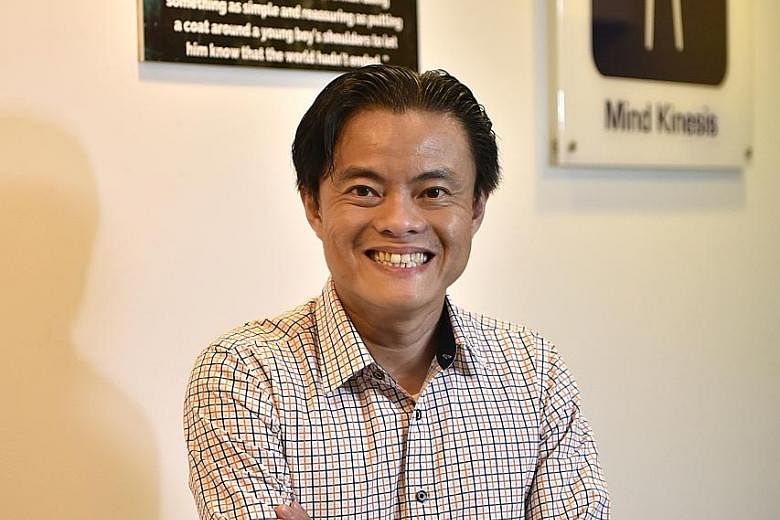Entrepreneur Cayden Chang recalls the days when investing was nothing more than a sport of speculation, fuelled by the need to make a quick buck.
Stocks, mostly in technology, were bought on a whim, driven mostly by market sentiment, historical price movements or tips from peers. As is the norm in such cases, he was losing more than the profit he was making.
The more he lost, the more money he poured into the market, in the hope of hitting a jackpot.
"Sometimes people call it speculation, but basically it was gambling," said the 46-year-old founder of Value Investing Academy, which teaches value investing.
The eye-opener came when Mr Chang lost $50,000 in the 2001 dot.com crash, just weeks before his wedding.
What followed were years of hard work and self-reflection.
He said: "I started asking myself, if future stock prices could be determined by historical movement, wouldn't computer programmers become billionaires just by writing codes to predict prices?"
This realisation led to a learning curve - reading books, attending certified courses overseas, talking to experts - before Mr Chang was confident enough to take a plunge into the market.
-
Worst and best bets
-
Q What has been your biggest investment mistake?
A My biggest mistake happened in 2001 when I speculated in stocks. Not only did I lose all my savings of $50,000, I also lost all the time spent to save up the money.
In addition, I lost my self-esteem. Mr Warren Buffett is right. Rule No. 1 in investing is never lose money, because it's easy to lose money but difficult to get it back.
Q What has been your best investment?
A My best investment is a master's degree I took around 1999.
My first two degrees were a Bachelor of Science in biology and a Bachelor of Science (honours) in zoology. After working for about five years, I realised that I was not going anywhere.
I decided to do a switch and took up a full-time Master of Science (e-business) with NUS Business School.
Unfortunately, the dot.com bubble burst in 2001. I belonged to the first and last batch.
But the exposure to e-business and the knowledge I gained prepared me for the years ahead when I started to invest again, and also in running my business.
Now, armed with his unique method of value investing, the two-time cancer survivor trains those who, like him, want to invest and not gamble.
Q Moneywise, how were your growing-up years?
A I grew up in a big family with three older brothers.
My mother was a housewife and my father was a fishmonger.
Our circumstances were so bad that, I was told, my mother had wanted to sell me as a newborn in exchange for eggs, tins of condensed milk and Milo to feed the rest. But good sense prevailed.
We lived in a one-bedroom Housing Board flat. My father's business tanked when I was in junior college - it was financially a very bad phase for the family.
We siblings could not afford simple things like hamburgers, birthday presents for classmates or nice clothes for Chinese New Year.
My self-esteem was pretty low during that time and I fell into bad company. It was around that time that I resolved to get rich.
Q How did you get interested in investing?
A I had always wanted to be rich so that I could be like my classmates.
When I started working, I invested in stocks to make quick profits without understanding the fundamentals. I was mostly speculating, which eventually led to me losing $50,000 that was meant for my wedding. So I had to borrow money from my then fiancee to pay for our wedding. I promised to pay her back.
I started working two jobs, but still my salary was not going to be enough to pay back my wife, and earn what I had initially lost.
That was when I realised I need to start investing again, but this time, prudently and conservatively.
I took courses in investing and read books and other materials to understand the subject. I jumped back into the market when I had saved another $30,000.
Q Describe your investment strategy.
A I consider myself a value investor who puts his money in the stock market using two main strategies.
First, my most basic strategy involves investing in low-cost index funds. I am a firm believer in the investment value of exchange-traded funds (ETFs), which have a low expense ratio. The only risk to such index funds is if the fund manager closes shop.
Otherwise, ETFs are the safest bet if one invests a fixed amount on a regular basis in such funds.
The best time to buy is during a market crisis.
Second, I also screen for stocks predominantly in the United States market, and evaluate if the companies are good or bad.
By that, I mean studying fundamentals and growth trajectories.
If they are good, I will estimate if they are undervalued or overvalued. If I find the stock overvalued, I will just adopt a wait-and-watch attitude for the right time to buy.
Otherwise, I will invest in the company if I truly understand the business model and fundamentals.
My value investing methodology also encourages selling US options based on companies with good fundamentals.
Q What's in your portfolio?
A My portfolio is a seven-figure sum, 40 per cent of which is invested in my investing academy, as well as my Neuro-linguistic Programming Academy which teaches mental strategies for personal mastery and people mastery.
The rest of the portfolio comprises 5 per cent in liquid funds, 5 per cent in ETF investments and 50 per cent parked in stocks in the Singapore and US markets.
These also give me passive income, predominately from dividends and options premiums.
Any excess dividends will be allocated back to stock investments.
Apart from this, I own an HDB property in West Coast which is valued around $700,000.
I keep some cash for emergency and for new opportunities in case there is an economic crisis.
For my wife and two daughters, who are aged six and nine, I have invested in their health insurance.
Q How are you planning for retirement?
A Financially, I can retire immediately together with my family.
I have passive income from my investments like my stocks and index funds. I also have my business, which is doing well, but in which I continue to invest to ensure that it will thrive even after me.
My insurance policies will take care of my family's security.
But all this does not mean I will stop working right now. I need to continue working to make myself feel useful.
Q What does money mean to you?
A I have been asking myself this question for many years.
I have realised eventually that money gives me a form of security, and a chance to do good through charity. I do all that and more.
I have never known how to buy expensive stuff to show off or to prove anything.
All I want is to have money in case something happens, and I have the money to solve the problem.
Q Home is...
A I live in a five-room HDB flat in West Coast Road.
I bought it for $680,000 and it cost me another $60,000 for a simple renovation.
It is a very old flat with a large floor area that is near my in-laws' home, so they can help take care of our girls when my wife and I are busy.
Q I drive...
A I have a driving licence but I have never owned a car. I commute like most Singaporeans by BMT - bus, MRT and taxis.


